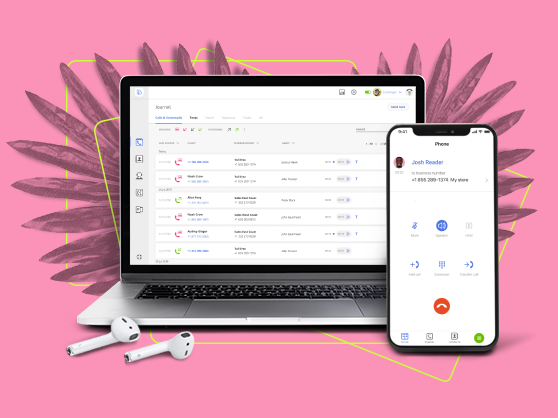The article covers:
- Necessity of a call-management system for business;
- Advantages of virtual phone number systems;
- What should be done before deciding on a virtual phone system provider;
- Main things to consider when choosing a hosted call-processing solution;
- MightyCall as a robust virtual phone system option.
A guide to cloud phone systems ― how to choose an ideal provider
So, it’s finally happened ― you’ve launched your own small business project! It may be an online shop, pizza delivery, an inn or a translation agency… the industry doesn’t matter much. A common trait of almost all small establishments is that they work with end-users directly. For them, a client is a valuable asset and promotion campaigns emphasize hand-picked quality with a personal approach.
When the initial euphoria dwindles and marketing efforts yield the first results, it starts to dawn upon a business owner that efficient conversion and subsequent loyalty retention strongly depends on flawless communication. As the number of potential and current customers grows, it becomes harder and harder to respond calls and messages on time. The clientele complains of busy telephone lines and long response times as you realize that your small team has virtually no time to do their jobs because of all these calls. Now’s the time to optimize the call-processing model before you start losing clients due to communication bottlenecks.
How can a virtual call management system ease the communication load and make you more accessible? How do you choose a good virtual phone number provider? Let’s find out!
Call processing: why go virtual?
Nowadays a virtual business number is not solely restricted to huge enterprises, it is a must for any business owner. Would you say that a person who prints his/her personal contacts on a business card is professional? But it’s not all about image, it’s also about utility. Lost your cellphone or access to your SIM card? Moved to another premises? Need an IVR to handle incoming calls across multiple lines? Toll-free or vanity number? No problem!
A business number is like an umbrella which covers your communication needs with a single contact. But if your company includes several employees, you surely can’t share a single number between all of them. Oh, but you can! There are two ways to do it: a conventional on-premises PBX with all its costly equipment and huge operation-and-maintenance manuals. The second way is going virtual.
There are many companies offering hosted PBX services at affordable rates: you get the functional of a robust phone system without the main disadvantage ― associated hardware. Some providers (MightyCall, for instance) support both conventional telephone lines and VoIP technology: this makes it possible for business owners to use whatever equipment they wish in any possible configuration.
No investing in equipment means that SMB owners can enhance the power of the system as they grow. A business with 3-5 employees doesn’t require many sophisticated features, while an establishment with a staff of 25 will benefit from wider functionality. A wise decision would be to start with a basic rating plan and try out the most essential features. In case you require more, just subscribe to the next plan up. It literally takes a just couple of minutes. So why not take the opportunity to drastically improve your communicational model at no financial risks? There are no barriers other than the problem of choice. Which virtual number provider is better? Here’s a short guide on how to pick an adequate hosted call processing system according to your communication demands.
Doing homework
Analyze your current business. Before even visiting the websites of your potential cloud phone service providers, you will have to do a bit of homework. Take a moment to think about the basic characteristics of your company.
- Study your staff: number of employees, their location (in-office or remote), typical daily duties, required level of connectivity. Do they work relatively independently? How does teamwork function ― company-wise or at a departmental level?
- Try to get statistics on your typical customers. Pay attention to basic demography and the most frequent reasons for people to call your office. The ages of your typical clients and their educational level determines the most likely way they’ll try to contact you: younger people prefer leaving messages via social networks, email or a website; older generations usually just dial the number. People with more free time are happy to use a self-service like voice menus, busy bees want a human operator immediately.
- Gather data on your current infrastructure: equipment at hand (landline phones, computers, IP-telephony devices, cellphones) and available lines. Do you provide your employees with business mobile phones/SIM-cards? How many of your office workers are equipped with landline phones? What about your website ― it’s also a valuable asset.
- Communication budget. How much do you spare on interaction? What are the main items of expense? How can you possibly optimize them? How much are you willing to allocate to a virtual phone system?
Determine what features you require. Once you have all the information at hand, think about the essential features you require from a call processing system. If your company has a good website and gets most of its clientele from the internet, you will likely need a system capable of working in conjunction with web assets. Some providers offer integration with popular social media networks or dedicated widgets allowing to make calls or leave messages directly from your website. On the other hand, if your communication is mostly tied to landlines, seek for unlimited extensions, full PSTN support and a developed interactive receptionist feature (although it is always useful to have it). Are employees highly mobile and don’t stay in an office for long? Then pay attention to mobile support and bring-your-own-device connectivity.
And don’t forget to think about the future. Ask yourself how do you see your company in a couple of month? In a year? Make an informed guess and extrapolate your current communication demands to the nearest future. Do you plan to hire more staff or expand your field of work? Expand the business affairs to nearby states or go nationwide? Use your imagination and existing business plans to pinpoint your needs ― it will be our secondary list of essentials.
A cloud-based call processing service: things to consider
Alright, now you have all the preliminary data. It’s time to read reviews, study comparison charts and visit the websites of your potential virtual phone number providers. That’s where the informed decision-making begins. There are many things to consider and it’s very important not to miss several crucial aspects. Let’s enumerate them.
Features. Of course, any decent call management solution is all about features. A provider’s website will try to overwhelm potential clients with tons of available functions. Actually, you will never need most of them, so remember to use your trusted weapon ― the list of primary and secondary essentials. It will help to filter out those providers who are not up to your demands. Typical things to consider include device support, call forwarding, virtual receptionist, website integration, inbound/outbound calls support, mobile applications, etc. Make sure that the system supports all the communication channels you widely use.
Simplicity. Cloud-based technology is famed for the easy-to-start principle. Indeed, you don’t need to purchase and connect any hardware, so getting started takes minutes. But every business is different, so typical solutions might be less-than-ideal for you: a little bit of tuning is always required. Configuring and tuning the system may prove to be a headache. Make sure that your provider has guidelines, step-by-step manuals or video-instructions on how to setup the product correctly and fine-tune it for maximum efficacy. Needless to say, the system should also be easy-to-use, meaning you don’t have to click through numerous sub-menus to access popular functions. An ideal version is some kind of a dashboard to view all the system information, voicemail and configuration options.
Analytics. Efficient call processing is unthinkable without gathering and analyzing the communication data. Keeping your hand on the beat allows to pinpoint bottlenecks of your communications setup and amend them accordingly (activate additional features, purchase equipment or hire new staff). Such features as responded/missed calls statistics and time-to-respond are efficient tools to decide on encouraging or criticizing a particular employee. Call recording finds its use in teaching new staff members how to achieve a desired level of call handling professionalism. That said, ensure that your future virtual phone number provider is able to report explicit statistical data in a convenient and easy-to-analyze manner.
Technical support. Cloud-based model means that all the vital equipment (servers, data-banks, telecom infrastructure) is located on a provider’s side. Should any problems occur, the provider must be prepared to solve them as quickly as possible and you ― to report the issues promptly. There are five tiers of tech support.
Tier 0 is limited to self-help via FAQs knowledge bases and manuals, Tier 1 specialists gather basic information about the user’s setup and problems through call-centers or Internet-forums. Tier 1 staff may come up with solutions for typical problems and minor issues, but if the problem is more serious, they relay it to the next tier. Level 2 deals with typical hardware failures and in-depth software analysis for more sophisticated troubleshooting. Tier 3 is reserved for unique or extremely urgent problems. It carries out a thorough research for causes and possible solutions and often sends this information to software developers who then come up with a patch or an update. Of course, a decent provider has all three tiers of support and offers multiple ways to report your issues.
Updates. This point is closely associated with the previous one. If a system is well-supported, sooner or later the R&D department gets enough information to issue patches for even the rarest and most evasive bugs. The update frequency is also important, but more frequent doesn’t mean better. If it is often necessary to alter the code, it means that the underlying programming is raw, under-tested. Tons of patches suggest that the product has lots of really pesky bugs totally unexpected by the developers. Opt for stability. Search for a provider that issues updates at a steady pace, without rush. With that, you can rest assured that any bugs you can theoretically face will be minor. The ongoing process of adding more features with each update shows that the product is not abandoned. Thus, in a couple of years you won’t end up with an obsolete piece of engineering, devoid of state-of-the-art functions.
Scalability. Virtual systems are and should be easy to grow along with your business. Unfortunately, some providers may hamper your development by imposing cancelation fees and longer-than-necessary contracts. When opting for a provider, study the list of basic and advanced features to make sure the provider offers services necessary for your growth (you’ve made the list of potential necessities, right?). Furthermore, you should be able increase/decrease the number of features in a package at the end of a period (usually, a month). Adding new functions at your discrepancy is also immensely useful.
Rates. When studying the available options, pay attention not only to monthly fees ― they are roughly similar across providers ― but also to features you get for that money. You may face a situation when after subscribing to a service for $10 a month, you suddenly realize that some absolutely indispensable features will cost you additional $30, while a counterpart provider has already included them in a $20 rating plan.
A typical rating plan also includes a certain number of pre-paid minutes and/or SMS while anything more than this limit is charged at a pay-per-minute base. If you are not sure that the included minutes will suffice and the next plan includes just too many unnecessary things, consider cents/minute pricing ― it should be adequate, just in case. Also beware of hidden costs. Certain terms in small type can seriously impact the overall communicational overheads.
Safe trial. Pick a provider who offers demo trials or a money-back guarantee in case you change your mind. You should be able to play it safe until fully sure of the system’s capabilities and reliability. Once on a trial/initial period, it is always useful to ask the opinion of your employees, partners or family on whether the system is actually easy-to-use and robust.
MightyCall virtual number provider is one of the best options to consider in this field. Perfectly suitable for SOHO, small and medium business owners alike, it guarantees a 30-day money back period. MightyCall works on multiple channels (website, landline, cellphones, VoIP) with integrated business SMS, chat, email and social media. A centralized web-based dashboard and mobile apps entitle you to thorough interaction analytics. Known for its outstanding teamwork features and tech support, MightyCall offers flexible payment rates starting with $15/month. Play safe and try us now ― in an unlikely case of dissatisfaction you’ll not lose anything. Oh, yes ― free phone number porting is also included.




























